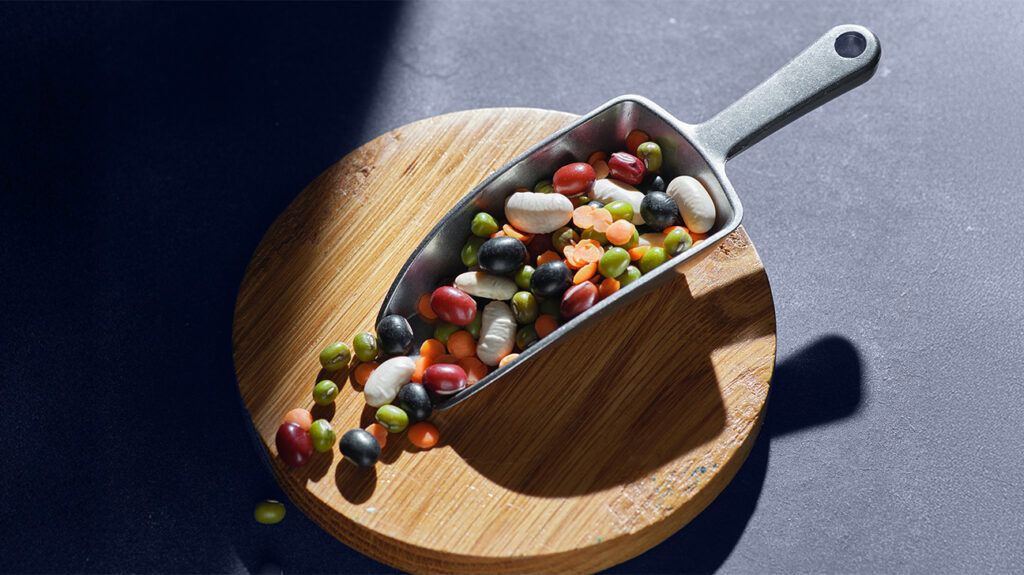Beans are a plant source of protein, fiber, iron, and vitamins. They can form part of a nutritious diet that may benefit the heart, gut, liver, and more.
In this article, learn about nine health benefits of beans, including getting more protein and reducing the risk of heart disease.

Beans are the seeds from flowering plants in the Fabaceae family and are classified as legumes. Legumes include beans, lentils, and peas.
Beans grow in pods or capsules that develop from flowers. They are available dry, canned, or frozen.
They differ nutritionally from green beans or wax beans where a person eats the entire pod.
Beans contain amino acids, which are the protein building blocks the body uses to heal and to make new tissues, such as bone, muscle, hair, skin, and blood. Protein is an essential nutrient.
There are many types of beans. Dried beans need cooking to make them tender enough to eat. Canned and frozen beans are typically ready to eat after warming on the stove or in the microwave. Some of the most popular bean varieties include:
- lima beans
- black beans
- black-eyed peas
- soybeans
- kidney beans
- garbanzo beans
- navy beans
- pinto beans
- red beans
Beans offer the following properties and health benefits:
Protein
Protein is a vital nutrient that plays a key role in maintaining and repairing the body. Beans are high in amino acids, the building blocks of protein.
There are
Animal products, soy, and quinoa are all complete proteins, which means they contain all nine essential amino acids.
However, of all the types of beans, only soybeans contain all nine amino acids.
People can combine incomplete proteins with nuts, seeds, dairy products, or grains at a single meal or throughout the day to make complete proteins.
For example, a person can:
- eat beans with rice or quinoa
- have black beans at lunch with almonds or cheese
Beans are a useful source of protein for vegetarians and vegans.
They are also lower in calories and saturated fat than some other protein sources, such as meat and full-fat or low fat dairy products.
Examples of the protein content of beans are:
A 100-gram (g) serving of canned black beans provides
A 100 g serving of shelled edamame beans provides
Folate
Beans contain several vital nutrients, including folate. Folate is essential for overall health, for making healthy red blood cells, and for helping prevent neural tube defects in a fetus during pregnancy.
A 100 g serving of shelled edamame beans provides
Antioxidants
According to research, beans are rich in polyphenols, a type of antioxidant.
Antioxidants
Free radicals can cause cell damage that can result in various diseases. Antioxidants help the body remove free radicals. In this way, antioxidant-rich foods, such as beans, can help protect the body from disease.
Heart health
Consuming beans regularly can
A
Other research suggests that nutrients in beans may help lower cholesterol. High cholesterol is a risk factor for heart disease and heart attacks.
Reduced risk of cancer
According to the American Institute for Cancer Research, the dietary fiber in beans can help decrease the risk of colorectal cancer. This may be because they encourage the growth of beneficial gut bacteria.
Beans can also decrease the risk of weight gain, overweight, and obesity. Having excess body fat increases the risk of at least 12 different cancers.
Diabetes and glucose metabolism
Beans may help stabilize blood glucose levels or even prevent diabetes.
A
A 2023 study suggests beans are beneficial for managing blood sugar levels. Researchers gave volunteers varying amounts of beans and controls like corn, rice, pasta, and potato and measured their blood sugar responses. Beans outperformed starchy foods in reducing blood sugar levels, with the optimal dose being a quarter of a cup.
Preventing fatty liver
Nonalcoholic fatty liver disease (NAFLD) happens when fats accumulate in the liver. It can develop alongside obesity, high cholesterol, high blood pressure, and other aspects of metabolic syndrome.
Doctors treat fatty liver disease by focusing on weight loss, controlling blood sugars, and reducing blood levels of fats, such as triglycerides and low-density lipoprotein (LDL), or “bad” cholesterol. Replacing high-fat animal proteins with beans is a good step towards better liver health.
Controlling appetite
When a person eats beans, the fiber and healthy starches they contain can help create a feeling of fullness and satisfaction. This could help prevent overeating and help with weight management.
Improving gut health
Research has shown a variety of beans, especially black beans, enhance gut health by improving intestinal barrier function and increasing the number of beneficial bacteria. This may help prevent gut-associated diseases.
Healthful gut bacteria also support immune system function and may promote weight loss.
The time it takes to cook beans will depend on the type of bean.
When preparing dried beans:
- Wash them before cooking and remove any that are shriveled or discolored.
- Soak beans overnight to soften them and shorten the cooking time. Discard water and rinse.
- Bring beans to a boil in plenty of fresh water, boil for at least 10 minutes, then simmer until soft.
Canned beans are precooked, so people can add them to a variety of dishes without additional preparation. However, people should check the label before buying canned beans, as some cans contain a lot of added salt. Canned beans that contain no extra salt are available.
Some simple strategies for adding beans to a regular diet include:
- Replacing meat with beans: Try adding beans instead of meat to soups, casseroles, and pasta dishes.
- Eating chilled bean salads: Beans are tasty and filling as the main ingredient in a salad or as a garnish to other salads.
- Mixing beans and grains: Adding beans to grains can turn an incomplete protein into a complete one. This is useful for people who follow a plant-based diet.
Beans provide protein, fiber, iron, and antioxidants that make them a healthy addition to the diet. They may help control blood sugar, improve gut health, and prevent conditions such as cardiovascular disease, diabetes, and cancer.
People should increase their intake of beans gradually to reduce the risk of intestinal discomfort.


